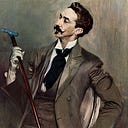From Zola to Édouard Louis: The Novel As Catalyst for Change in French Literature
“What is Literature?” asked Jean-Paul Sartre boldly in a now classical essay where her argued that one writes prose to change society.
Literature has been used as a means to raise awareness of social issues practically since its very inception. In Greco-Roman texts one can find appeals to the state and denunciations of injustice just as today people on social media websites such as Twitter denounce the incompetence of their governments or the unmeasured greed of billionaires and corporations. Although the formats used for activism are incredibly diverse — from the pamphlet and the manifesto to even theater and avant-garde poetry — , the novel must be one of the most interesting case studies for how to deliver activism while thinking about style and delivery.
The French tradition has known literature-as-activism since at least the Enlightenment, when epistolary narratives such as Montesquieu’s Lettres persannes and Graffigny’s Lettres d’une Péruvienne showed French readers the flaws in their society through the use of the point of view of outsiders. An Iranian sultan and a Peruvian princess became spokespeople for French writers who started to question the state of things in France. Writers discovered they could simultaneously entertain and illuminate a growing readership, one that was eager to hear challenging ideas reflected on the media.
During the long nineteenth century and its rapid wave of changes, new forms of activist literature came into existence. Of particular importance are Émile Zola and the naturalists, whose experimental literature (that is, novels in which Zola performs experiments on his characters) suggested that people are a product of their environments. In Zola’s world, alcoholism among the poor is not a mere individual flaw but rather the result of their relentless exploitation and lacks of support networks in a bustling urban environment. Zola wrote a series of novel, the Rougon-Macquart series, following the lives of French family lines during the Second Empire. Each novel is centered around a specific occupation and an exploration of the issues surrounding it: from the retail worker Denise in Au bonheur des dames to miners in Germinal and sex workers in Nana, Zola wants to expose to his bourgeois readership the grim reality of the lives of the working-class. The positivism of Zola’s era found a home in the literary realm, when writers believed the pen could bring about positive change. Zola and his followers truly believed writing was a force of change.
In the twentieth century, while activist literature prevailed, the rise of the literature of the Absurd signaled a shift in attitudes among writers. Although most of them were involved in politics, skepticism around institutions became more widespread. Major works such as Louis-Ferdinand Céline’s Voyage au bout de la nuit, whose anarchist and nihilist tendencies tend to cause discomfort in contemporary readers, and André Malraux’s La condition humaine, which failed to portray the Chinese revolution as the solution to the suffering of the masses, questioned whether writing for a specific political cause was truly worth it. Literary giant Jean-Paul Sartre, ironically, disagreed with the political detachment of literature, even if his own literary career was kickstarted by a novel, La nausée, that dealt with the existential, quasi-postmodern dread of a character similar to himself.
World War II might have only further proved the need for distancing art from politics, with the post-war nouveau roman of writers like Alain Robbe-Grillet and Marguerite Duras focusing instead on playing with stylistics and going deeper into the human psyche. That is not to say Robbe-Grillet, Duras, and others did not voice their political opinions, nor that phenomena like the uprisings of the late 1960s and the AIDS crisis of the 1980s and 1990s did not give birth to a number of activist-writers (as well as French-speaking writers abroad speaking of conditions in their own regions), but literature as a political weapon would not enjoy its same prominence as during Zola’s era.
The contemporary literary landscape is incredibly diverse to make any assertion that French literature is moving towards activism again. On one hand, popular writers such as Michel Houellebecq continue to portray the despair of the postmodern era in a manner not unlike that of Camus and Sartre almost a hundred years ago. On the other, rising stars such as Édouard Louis, whose depiction of his life as a working-class, queer man growing up in a neglected, industrial region of France have earned him accolades globally and turned him into a bestselling author, are moving towards showing people that poverty and hate are systemic and not personal issues. Neoliberalism and political incompetence are unmistakably the bad actors in Louis’ literary works. His autobiographical prose, so often spoken about next to similar works by Annie Ernaux and Serge Dubrovsky, marries the personal to the political.
What is next for the novel as a tool for political activism? It is hard to tell, but literature certainly reacts to its environment and to larger academic, intellectual or popular culture trends. The willingness to denounce injustice, overtly or not, has survived the most chaotic periods of human history. Our postmodern era is no different in this regard.
